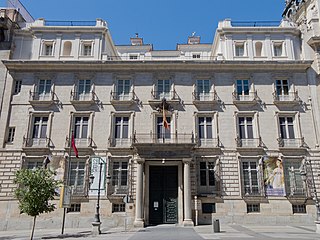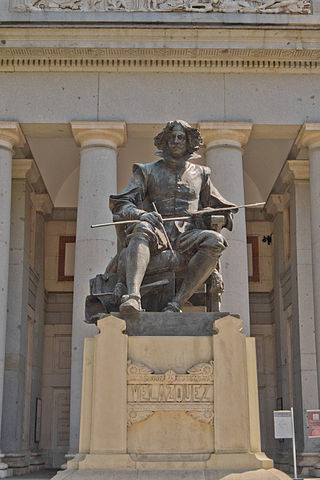Related Research Articles

Las Meninas is a 1656 painting in the Museo del Prado in Madrid, by Diego Velázquez, the leading artist of the Spanish Golden Age. It has become one of the most widely analyzed works in Western painting, due to the way its complex and enigmatic composition raises questions about reality and illusion, and the uncertain relationship it creates between the viewer and the figures depicted.

María Victoria Eugenia Guadalupe Martínez del Río Moreno-Ruffo is a Mexican actress notable for her roles in telenovelas.
Mundo de Fieras is a Venezuelan telenovela written by Ligia Lezama for Venevisión. The telenovela premiered on Venevisión on March 6, 1991 and ran for 239 episodes until March 4, 1992 where it achieved a significant amount of success in Venezuela. The telenovela was distributed internationally by Venevisión International.

The Real Academia de Bellas Artes de San Fernando, located on the Calle de Alcalá in the heart of Madrid, currently functions as a museum and gallery. A public law corporation, it is integrated together with other Spanish royal academies in the Instituto de España.
Diego Fernández de Cáceres y Ovando was a Spanish military and nobleman.
El Enemigo is a telenovela made by Mexican TV network Televisa, directed and produced by Ernesto Alonso. It was broadcast in 1979, on weekends only. It was a remake of the 1961 telenovela of the same name.
The 2012–13 Segunda División season was the 82nd since its establishment. The season started on 17 August 2012 and the league phase of 42 rounds ended on 9 June 2013. The entire season ended on 22 June 2013 with the promotion play-off finals.
José Alonso is a Mexican film and telenovela actor.
Jean Carlos Simancas is a Venezuelan theater and television actor popular for his various roles in telenovelas.

Las Bravo is a Mexican telenovela produced by María del Carmen Marcos for TV Azteca in 2014.
La casa de las fieras is a Mexican telenovela produced by Teleprogramas Acapulco, SA and originally transmitted by Telesistema Mexicano.
La traición is a Mexican telenovela produced by Ernesto Alonso and directed by Raúl Araiza for Televisa in 1984.

El ministerio del tiempo is a Spanish fantasy television series created by Javier and Pablo Olivares and produced by Onza Partners and Cliffhanger for Televisión Española (TVE). It premiered on 24 February 2015 on TVE's main channel La 1. The series follows the exploits of an investigative team in the fictional Ministry of Time, which deals with incidents caused by time travel that can cause changes to the present day.

Ortún Velázquez de Velasco was a Spanish conquistador. He is known as the co-founder and first governor of Pamplona in the Norte de Santander department of Colombia, which borders Venezuela.
Jean Canavaggio is a French biographer and former emeritus professor of Spanish literature at the Paris West University Nanterre La Défense.

Alfredo Arturo Castro Gómez, best known as Alfredo Castro, is a Chilean actor. With a well established trajectory in theater and television, he became one of the most required Latin American film actors of the 2010s.

Apollo as Victor over Pan, also known as Apollo's Victory over Marsyas, Tmolus declaring Apollo winner in musical competition with Pan and Apollo and Pan, is a 1637 oil-on-canvas painting by Flemish Baroque painter, draughtsman and tapestry designer Jacob Jordaens.

Velázquez or the Statue of Velázquez is an instance of public art in Madrid, Spain. Located in front of the main gate of the Prado Museum, it is dedicated to Diego de Velázquez.

Prince Baltasar Carlos in the Riding School, Spanish: La lección de equitación del príncipe Baltasar Carlos, is a painting by Diego Velázquez, painted at the Palacio del Buen Retiro outside Madrid, probably in 1636. There are two versions of the painting, one on loan to the National Gallery in London, the other in the Wallace Collection in the same city; the latter is sometimes attributed to the studio of Velázquez, sometimes to Velázquez himself.
References
- ↑ "Las fieras on Alma Latina" . Retrieved December 11, 2014.